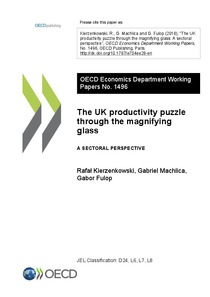The UK productivity puzzle through the magnifying glass. A sectoral perspective
"Since the start of the Great Recession, labour productivity growth has been weak in the United Kingdom, weaker than in many other OECD countries. The productivity shortfall, defined as the gap between actual productivity and the level implied by its pre-crisis trend growth rate, was nearly 20%...
| Main Authors: | , , |
|---|---|
| Institution: | ETUI-European Trade Union Institute |
| Format: | TEXT |
| Language: | English |
| Published: |
Paris
2018
OECD |
| Subjects: | |
| Online Access: | https://www.labourline.org/KENTIKA-19301372124911295549-The-uK-productivity-puzzle-thr.htm |
| Summary: | "Since the start of the Great Recession, labour productivity growth has been weak in the United Kingdom, weaker than in many other OECD countries. The productivity shortfall, defined as the gap between actual productivity and the level implied by its pre-crisis trend growth rate, was nearly 20% for output per hour at the end of 2016. This study assesses the UK productivity puzzle and discusses its possible determinants at the sectoral level. Most of the UK productivity underperformance is structural rather than cyclical. Half of the productivity shortfall is explained by non-financial services (with information and communication being the largest contributor), a fourth by financial services, and another fourth by manufacturing, other production and construction. All but non-financial services and the construction sectors contribute disproportionately to the productivity shortfall compared to their shares in overall output and hours worked of the UK economy. In non-financial services, large increases in self-employed with no employees, reduced matching of skills to jobs and a lower capital-output ratio may have been a drag on productivity. Stagnant productivity in the financial sector is mainly linked to reduced risk-taking and leverage, as reflected by declining total factor productivity following its steep increases in the run-up to the crisis. Greater substitution of labour for capital and weak corporate restructuring have both held back productivity improvements in the manufacturing sector. Some causes of the productivity puzzle pre-date the crisis, including low tangible investment, too rapid expansion of financial services, weak innovation in the manufacturing sector, and a secular decline of oil and gas industries. This Working Paper relates to the 2018 OECD Economic Survey of the United-Kingdom (www.oecd.org/eco/surveys/economic-survey-united-kingdom.htm)." |
|---|---|
| Physical Description: | 39 p. Digital |

